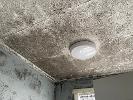Damp and mould - advice and guidance
Damp and mould issues are prevalent in many homes, and identifying the source of dampness is crucial for effective treatment.
There are four primary types of damp that can impact your home, see the following for more information and guidance about each:
Tenant responsibilities
To minimise condensation in your home, it's essential to take appropriate measures. As a tenant, you are expected to use your accommodation responsibly, ensuring it does not become damp or mouldy due to excessive moisture. Proper ventilation and heating are crucial to prevent dampness from accumulating.
If you experience dampness due to other issues, such as penetrating damp, rising damp, or plumbing defects (excluding minor blockages caused by tenant behaviour), it is your landlord's responsibility to address these problems. Be sure to report any such issues to your landlord promptly.
Landlord responsibilities
Your landlord is obligated to address damp or mould issues if they are caused by a repair problem and impacting your health and safety. Additionally, landlords must legally provide adequate heating and proper ventilation for your home.
Common issues your landlord is required to fix include:
- Faulty rainwater systems, such as broken gutters
- Leaking pipes, like those from bathroom waste
- Malfunctioning heating systems
- Missing roof tiles
Once these problems are resolved, your landlord should repair any damaged plaster, skirting boards or flooring as necessary.
It is also recommended that bathrooms and kitchens be equipped with mechanical ventilation that includes a humidity sensor.
Reporting damp and mould
If your home is damp for any of these reasons, the cause of the problem will need to be assessed by our team. If the damp problems continue, please contact us as soon as possible.
We can assess cases of damp and mould to identify any health and safety issues and take appropriate action to deal with the problem.
You can report damp and mould issues by emailing privaterentedhousing@durham.gov.uk
Make sure to include:
- Your name
- Your address
- Contact number and email address
- a brief description of the problem
- If possible photographs of the problem
If you have a smart phone, we may request a video call with our team so we can fully understand the problems and deal with the issues quicker.


 Share this page on Facebook
Share this page on Facebook
 Share this page on Twitter
Share this page on Twitter
 Print this page
Print this page





